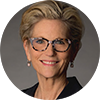Download PDF

One of my partners, Jeff Haag, retired a few months ago after a 40-year career as a neuro-ophthalmologist. Two days a week, we saw patients in the same practice and reviewed dozens of cases together over the years. I can hardly imagine practicing glaucoma without a neuro-ophthalmologist in the room next door. We didn’t just share patients. Jeff and I occasionally talked about our families, sharing some of the challenges and celebrating the joys.
Dawn, his primary ophthalmic technician, was reorganizing the rooms recently and when she found an old neuro-ophthalmology textbook, she was overcome with grief. While we’re happy for Jeff, who is cycling with his wife and spending lots of time with his grandchildren, we both feel his absence.
Our work relationships have a greater place in our lives than we realize. Two years ago, when I was giving the eulogy at my dad’s funeral, I saw my friends and neighbors in the audience, which I appreciated but also expected. But when I saw my ophthalmology partners scattered among the attendees, I was deeply moved. My friends showed up and they included my colleagues.
What is it about relationships with colleagues that makes them so important? For starters, we spend so much of our lives together. Dawn said that she spent more time with Jeff every week than with her own husband. That regularity is so impactful. While I might see my neighbors when I’m getting the mail or mowing the lawn, work schedules are more consistent and repetitive. Every week, I look forward to conversations with my partners. Some days, we don’t interact, but I know they are nearby and available.
In their book, The Good Life, Marc Schulz and Robert Waldinger discuss results from the Harvard Study of Adult Development, a multigenerational, 80-year study of happiness. In a TED talk, Waldinger summarizes the study’s most important finding: “It turns out that people who are more socially connected to family, to friends, to community, are happier. They’re physically healthier, and they live longer than people who are less well connected.”1
When I think of being in community, I think of the colleagues I see every week and those I see at meetings several times a year. They make me a happier person. And with colleagues, we also have a shared purpose. While the primary contributor to well-being is healthy relationships, having a sense of purpose is the second most important factor.2 One reason ophthalmologists are described as energetic and generally satisfied with their work is that our purpose is clearly defined: to improve vision and to prevent vision loss. And those who practice together—whether in a private or academic or corporate setting—also share business, cultural, and financial goals. Our well-being is intertwined.
In June, I rafted the Colorado River through the Grand Canyon with a dozen other ophthalmologists and their spouses. We screamed through the rapids, laughed at the increasingly off-color repartee, hiked canyons, jumped off the top of a waterfall, pitched our tents together, and sat in a circle every evening for cocktails, dinner, music, and storytelling. We dressed in crazy costumes one night, had a toga party another, and even staged a (nonofficial) wedding complete with cake, bridesmaids, and dancing. Before the trip, I knew most of these colleagues just a little or not at all. Now, I consider each one a good friend.
Over the years, I’ve also developed deep and enduring friendships with colleagues I see once or twice a year at meetings. We have so much in common that an annual or biannual visit has allowed us to cultivate a valued relationship.
Whether we see each other every day or once a year, our professional relationships as ophthalmologists affect the quality of our lives and shape our characters. I, for one, feel lucky to work with colleagues who share my values and whom I respect and like. I just didn’t expect to dance in a toga with a few of you.
___________________________
1 aao.org/waldinger. Accessed July 10, 2023.
2 Marc Schulz and Robert J. Waldinger, The Good Life (New York; Simon & Schuster, 2023).